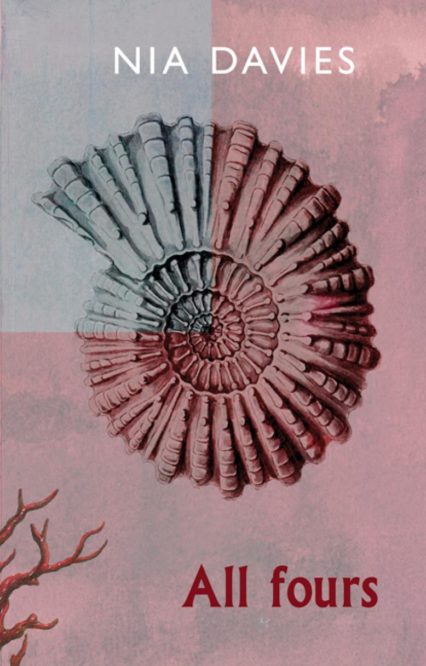Sophie Baggott reviews Nia Davies’ All fours, a poetry collection which asks more questions than it answers, transcending language to hint at the unknowable.
For several days All fours was my constant companion, as I tried to steer myself through Nia Davies’ beautiful, discombobulating words. Her debut poetry collection accompanied me as far as Hungary, where I woke early one morning to sit and read in a wicker chair by our typically elongated Eastern European windows. I opened the slim volume onto a poem named after a (likewise long) Hungarian word, megszentségteleníthetetlenségeskedéseitekért, meaning ‘for your [plural] continued behaviour as if you could not be desecrated’. My pencil then stumbled upon Davies’ line:
burnt in the wicker basket set up for such things
Wicker upon wicker; it was all very serendipitous, frankly. Davies’ poems often take intriguing, ludic routes. Ambiguity leads the way, a rule-bending and charismatic ringleader. Even the collection’s title, All fours, seems to be curved in question marks: sexual connotations? a reversion to toddler years? animalism?
The first of the potentials certainly plays a star role throughout her poetry. Musings on sex are dotted in all sorts of odd corners, most explicitly in her ‘Poem with sex’, embedded in which is the great line: ‘the underside of sex topples and I share a space with this thought’. Later, Davies’ ‘nature poem’ springs a surprise confession in one isolated stanza that simply states:
Actually I’ve had some pretty haphazard orgasms lately.
Perhaps one of the only characteristic elements of these equally haphazard poems is the absolute mystery around who this ‘I’ is. We, the audience, are blindfolded – we hear the words but form no image of the speaker(s). The second riddle, ‘You will never guess my name’, in Davies’ opening chapter proclaims this perfectly:
Call me mythic – I’m a toss-up between
‘project’ and ‘ongoing’.
Shrouding the self is a conscious decision from the get-go – Davies offers us, as the first poem, a piece called ‘About me’ that proceeds to tell us virtually nothing about ‘me’ other than that ‘me’ made to ‘swing out of a lime tree’ and would ‘listen through lids’. The panoramic puzzle (with more than a few missing parts) begins on the opening page.
Midway through the collection we meet ‘Hello Beautiful’ – an eerie, ominous poem, which reads to me as if an eating disorder is cajoling its victim (‘I am waiting to be your thin thing | I am already your insides’). Of course I have no idea in reality – Davies seems to channel addictively unreadable silhouettes right from the front cover to the blurb on the back. We’re palm-readers trying to reach into a clenched thorny-thatched fist; Davies hands us crossed wires, patternless punctuation, and apparently unconnected thoughts. Take these three extracts from her closing poem ‘I Want To Do Everything’:
Bibulous, happy, exploded in the litter
of pomegranate
In the bed we’ll live long to bear orang-utans.
Peeled wheat at breakfast, blood oranges and March.

They’re stunning, flaming images – and give nothing away on first reading. Elsewhere in All fours Davies writes a reverie that blossoms into the line, ‘What would life as a lawnmower be like?’.
As already manifested here, there are some astoundingly lovely phrases speckled among the zigzag thought processes. At one moment we have ‘a carpaccio of unfulfilled wishes’, at another we witness ‘an overspill of fluster’. I should warn though: the vocabulary is certainly an education and a nearby dictionary is advisable. Clavicles, cupula and kismet each make an appearance, for instance. On another note, some of the poems I’d like to hear out loud – the fourth riddle, particularly, with its forward slashes and ‘oğ oğ’.
The ‘oğ’s come from Turkish, Davies explains. This is a remarkably global collection, which seems to stream from a love of language in all forms. At times, though, the poet brought me home, toying with images that tugged back to Wales: ‘purchased buttons and spilled sprats’ (however unintentionally) slap-banged me into the heart of Cardiff Market. One of the poems in LONG WORDS is called – in translation; please don’t make me type out the original Turkish title – ‘Are you one of those people whom we couldn’t make to be originating from Czechoslovak?’. In it Davies talks of ‘malnutritioned chickens wandering into festive heaps | devilish uncertainty’. It is exquisitely peculiar.
In short, I take solace in a line from her Hungarian-inspired poem:
dear god look upon me kindly with your unknowable unsubstantial unverifiable looks
While I don’t deny the substance in All fours, there’s no disputing that Davies’ divine work tends towards the unknowable, the unverifiable – and is all the better for it.
Available now from Bloodaxe.











